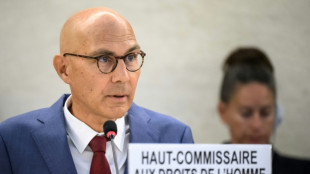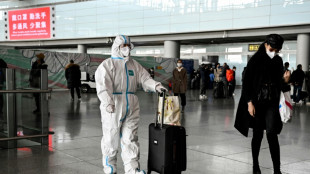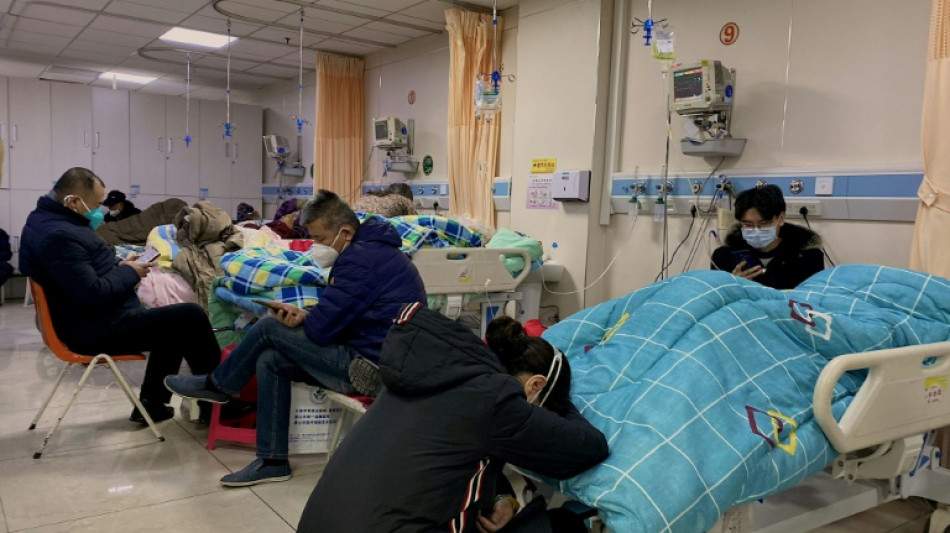
-
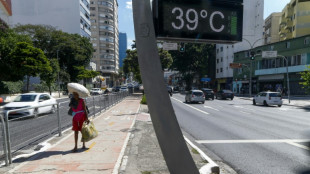 Brazil says 2024 was its hottest year on record
Brazil says 2024 was its hottest year on record
-
Soldier in Vegas Tesla blast suffered PTSD, no 'terror' link: FBI

-
 Lake Placid chosen as Olympic venue super sub if gamble on Cortina backfires
Lake Placid chosen as Olympic venue super sub if gamble on Cortina backfires
-
'Luke the Nuke' still living his teenage darts dream

-
 MLB Dodgers agree to terms with South Korean infielder Kim
MLB Dodgers agree to terms with South Korean infielder Kim
-
Bellingham grabs Real Madrid late Valencia win after Vinicius red

-
 US Olympian Kerley facing charges after clash with Miami Beach police
US Olympian Kerley facing charges after clash with Miami Beach police
-
Teenage sensation Littler storms to world darts title

-
 Judge to sentence Trump before inauguration in hush money case
Judge to sentence Trump before inauguration in hush money case
-
Microsoft expects to spend $80 bn on AI this fiscal year

-
 AC Milan rally past Juventus to meet Inter in Italian SuperCup final
AC Milan rally past Juventus to meet Inter in Italian SuperCup final
-
Trump-backed Republican Johnson elected speaker of US House

-
 Gaza rescuers say about 30 killed as truce talks resume
Gaza rescuers say about 30 killed as truce talks resume
-
UK, Germany electricity cleanest on record in 2024

-
 Oil from Russian tanker spill reaches Sevastopol
Oil from Russian tanker spill reaches Sevastopol
-
Man arrested for supplying drugs to Liam Payne: Argentine police

-
 US House rejects Trump-backed speaker in first ballot
US House rejects Trump-backed speaker in first ballot
-
European ministers urge inclusive transition on Syria visit

-
 Rickelton hits Test best as South Africa on top against Pakistan
Rickelton hits Test best as South Africa on top against Pakistan
-
Lebanon minister says working to 'resolve' Syria's new entry restrictions

-
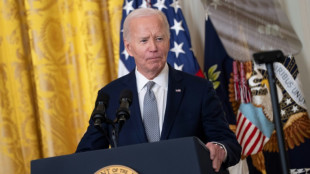 US announces $306 mn in new bird flu funding
US announces $306 mn in new bird flu funding
-
Salah targets Premier League glory in 'last year' at Liverpool

-
 Rockets fired from Gaza as Israeli strikes kill 16, rescuers say
Rockets fired from Gaza as Israeli strikes kill 16, rescuers say
-
Marseille coach De Zerbi defends 'strong' Ligue 1

-
 Rickelton, Bavuma tons put South Africa in strong position
Rickelton, Bavuma tons put South Africa in strong position
-
Breeding success: London zoo counts its animals one-by-one

-
 Fofana could miss rest of Chelsea's season
Fofana could miss rest of Chelsea's season
-
Republican speaker, Trump face test in Congress leadership fight

-
 Man Utd 'starving for leaders' ahead of Liverpool clash: Amorim
Man Utd 'starving for leaders' ahead of Liverpool clash: Amorim
-
Alcohol should have cancer warning label: US surgeon general

-
 Biden blocks US Steel sale to Japan's Nippon Steel
Biden blocks US Steel sale to Japan's Nippon Steel
-
Wall Street stocks bounce higher, Europe retreats

-
 Neil Young says he will play Glastonbury after all
Neil Young says he will play Glastonbury after all
-
Frenchman Castera plots roadmap for Dakar success

-
 Doha hosts PSG clash with Monaco in French Champions Trophy
Doha hosts PSG clash with Monaco in French Champions Trophy
-
Hamilton 'excited for year ahead' after Ferrari switch

-
 Man City must 'think' about De Bruyne future: Guardiola
Man City must 'think' about De Bruyne future: Guardiola
-
Biden blocks US-Japan steel deal

-
 French police to face trial for 'suffocating' death
French police to face trial for 'suffocating' death
-
British novelist David Lodge dies aged 89

-
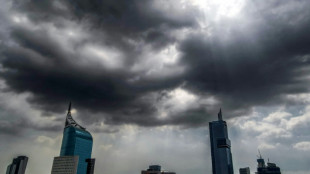 Indonesia says 2024 was hottest year on record
Indonesia says 2024 was hottest year on record
-
South African Lategan wins Dakar Rally prologue

-
 Barca coach Flick optimistic but 'not happy' over Olmo situation
Barca coach Flick optimistic but 'not happy' over Olmo situation
-
Djokovic Australian Open preparations take hit with loss to Opelka

-
 Indian duo self-immolate in Bhopal waste protest
Indian duo self-immolate in Bhopal waste protest
-
Indian food delivery app rolls out ambulance service

-
 Arsenal must 'flip coin' in Premier League title race, says Arteta
Arsenal must 'flip coin' in Premier League title race, says Arteta
-
European stock markets retreat after positive start to year

-
 World food prices dip 2% in 2024: FAO
World food prices dip 2% in 2024: FAO
-
The horror of Saydnaya jail, symbol of Assad excesses


Soaring Covid cases shine light on China's healthcare gap
Understaffed and underfunded clinics stand half-empty in parts of the Chinese countryside even as hospitals in major cities heave under an unprecedented Covid wave -- an illustration of the stark disparities in the country's healthcare system.
Visits by AFP journalists in the past two weeks have revealed sharp differences in demand for urban and rural hospitals in parts of northern China as many in the countryside head to big cities for a quality of care they simply can't get closer to home.
In one of the world's most unequal economies, China's centralised healthcare system drives money and resources towards urban hospitals at the expense of rural ones, a disparity that has become all the more intense as cases surge.
In the capital Beijing and the northern megacity of Tianjin, emergency wards have been so overwhelmed that dozens of mostly elderly patients have been accommodated on gurneys in public areas.
Crammed shoulder to shoulder and gasping for breath, many were hooked up to intravenous drips or oxygen tanks while machines monitored their vital signs. A few appeared unconscious or unresponsive.
Yet in the neglected rural town of Xin'an, the sparsely equipped local hospital was operating at well below full capacity.
In a poorly heated room near reception, around half a dozen elderly people huddled in thick overcoats, drips protruding from their arms.
But most of the seats were unoccupied, and the pressure on staff appeared far lower than their municipal counterparts.
- 'Lack of progress' -
"What we are seeing in rural China epitomises the lack of progress in China's healthcare reform," said Yanzhong Huang, senior fellow for global health at the Council of Foreign Relations, a nonpartisan US think tank.
"People dissatisfied with the poor quality of rural healthcare will bypass (local providers) to seek care in urban hospitals."
As the initial wave starts to ebb, the pressure on some facilities may be receding -- even as the seriously sick continue to flock to municipal institutions.
Many rural residents, meanwhile, struggle for nearby access to doctors and medicines, and public health literacy is often patchy.
A local shopkeeper in Xin'an said a Covid outbreak had swept through the settlement of around 30,000 people in December, but "the worst of it has passed".
And hospital staff and local residents there said those requiring treatment for severe illness usually made the 90-minute journey up the highway to Tianjin or pushed on to Baoding, a city some 200 kilometres away where a recent outbreak overwhelmed hospitals.
Medical services in mid-size municipalities also appear to be less stretched than in China's megacities.
In Tangshan -- a smaller industrial city of 7.7 million people -- the scene was calmer than that in Tianjin about two hours away.
Around two dozen patients of advanced age filled the resuscitation ward of a central hospital, with one nurse saying they had "all tested positive" for Covid.
Only three or four patients occupied makeshift beds in the corridors outside.
- Far from over -
Chinese authorities have said in recent days that the first wave of infections has hit a peak in cities including Beijing and Tianjin.
But the end is far from near, with officials warning of a multi-pronged outbreak in the coming weeks as city workers return to their rural hometowns during the winter travel season.
"To some extent, rural patients may have put extra strains on urban healthcare institutes," said Xi Chen, an associate professor at the Yale School of Public Health.
"However, unlike in urban areas, this wave of the Omicron outbreak has not reached its peak in rural China," he added
"Things may get significantly worse as migrants start to return to rural communities."
S.F.Warren--AMWN
